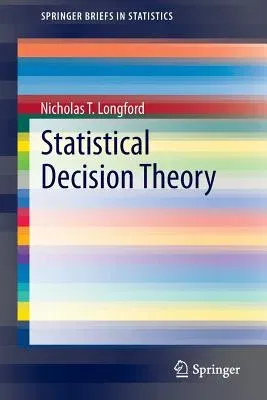Nicholas T Longford
(Author)Statistical Decision Theory (2013)Paperback - 2013, 30 October 2013

Qty
1
Turbo
Ships in 2 - 3 days
In Stock
Free Delivery
Cash on Delivery
15 Days
Free Returns
Secure Checkout
Part of Series
Springerbriefs in Statistics
Print Length
124 pages
Language
English
Publisher
Springer
Date Published
30 Oct 2013
ISBN-10
3642404324
ISBN-13
9783642404320
Description
Product Details
Author:
Book Edition:
2013
Book Format:
Paperback
Country of Origin:
NL
Date Published:
30 October 2013
Dimensions:
23.39 x
15.6 x
0.74 cm
ISBN-10:
3642404324
ISBN-13:
9783642404320
Language:
English
Location:
Berlin, Heidelberg
Pages:
124
Publisher:
Series:
Weight:
199.58 gm

